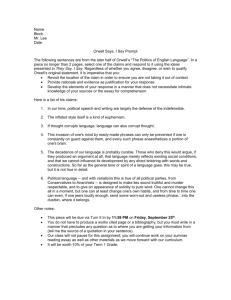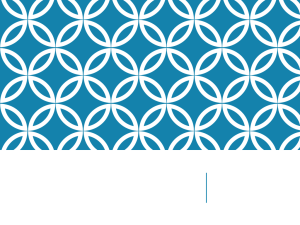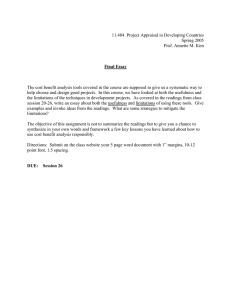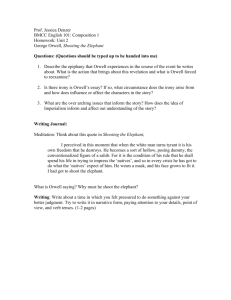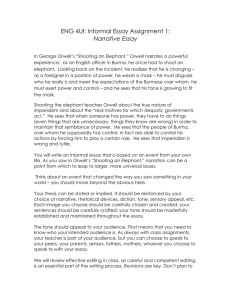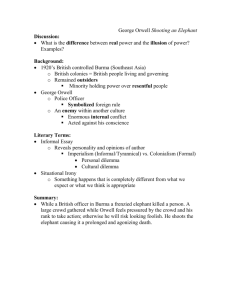CN 2011 first 9 weeks.doc
advertisement
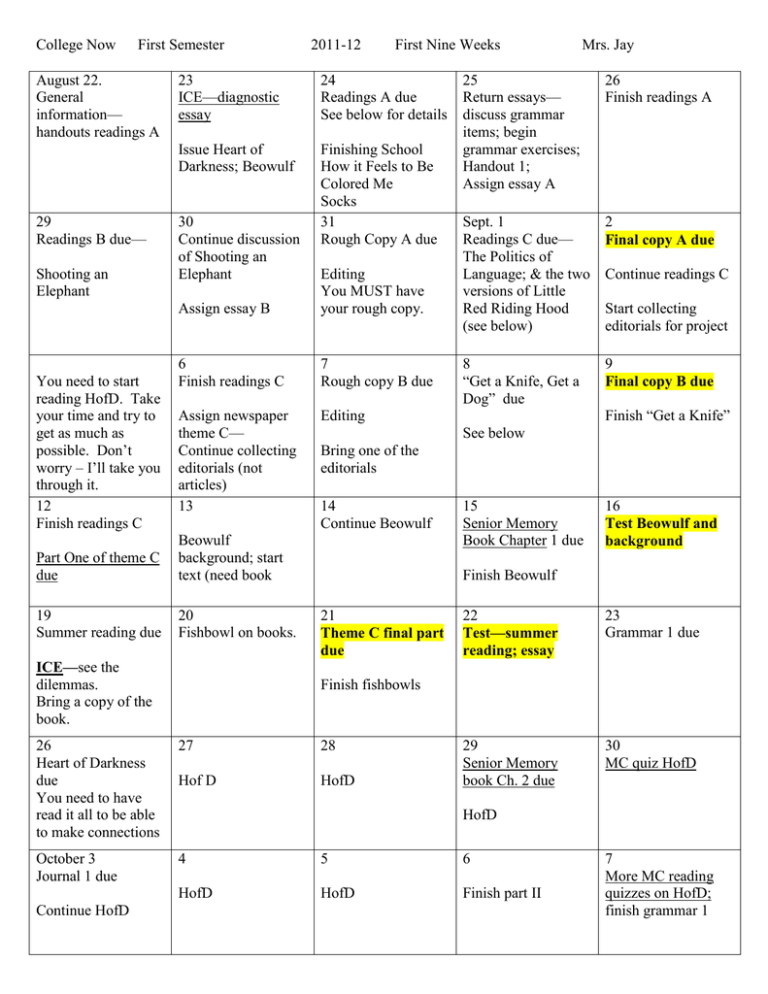
College Now First Semester August 22. General information— handouts readings A 29 Readings B due— Shooting an Elephant You need to start reading HofD. Take your time and try to get as much as possible. Don’t worry – I’ll take you through it. 12 Finish readings C 2011-12 First Nine Weeks 23 ICE—diagnostic essay 24 Readings A due See below for details Issue Heart of Darkness; Beowulf Finishing School How it Feels to Be Colored Me Socks 31 Rough Copy A due 30 Continue discussion of Shooting an Elephant Assign essay B Editing You MUST have your rough copy. 6 Finish readings C 7 Rough copy B due Assign newspaper theme C— Continue collecting editorials (not articles) 13 Editing Part One of theme C due Beowulf background; start text (need book 19 Summer reading due 20 Fishbowl on books. ICE—see the dilemmas. Bring a copy of the book. 25 Return essays— discuss grammar items; begin grammar exercises; Handout 1; Assign essay A 26 Finish readings A Sept. 1 Readings C due— The Politics of Language; & the two versions of Little Red Riding Hood (see below) 2 Final copy A due 8 “Get a Knife, Get a Dog” due 9 Final copy B due Continue readings C Start collecting editorials for project Finish “Get a Knife” See below Bring one of the editorials 14 Continue Beowulf 15 Senior Memory Book Chapter 1 due 16 Test Beowulf and background Finish Beowulf 21 Theme C final part due 22 Test—summer reading; essay 23 Grammar 1 due 29 Senior Memory book Ch. 2 due 30 MC quiz HofD Finish fishbowls 26 Heart of Darkness due You need to have read it all to be able to make connections 27 28 Hof D HofD October 3 Journal 1 due 4 5 6 HofD HofD Finish part II Continue HofD Mrs. Jay HofD 7 More MC reading quizzes on HofD; finish grammar 1 10 Your paper due on section III when we get to that part 11 12 13 14 HofD HofD Finish HofD Essay test HofD— grade for next nine weeks. OCE due next Friday HofD section III General information: This will be an intense nine weeks. If you have not done the summer readings, it will be quite taxing; however, not having completed the summer reading is NOT a justification for dropping the class. Survive this one and you are among the elite of the elite and eligible for hero status. This first nine weeks is a crash course in writing--personal and expository. We will be using non-fiction writings as models. ALL out of class writing (except senior memory books) will be submitted to turnitin.com in order to receive a grade. No exceptions. Set up your profile and be sure to submit each OCE as well as print out your hard copy. You do not print from my computer. I do not print your essays. All out of class writings are typed. --double spaced--12 point font--use MLA format always. This calendar and all handouts can be found on the Elkins’ web site (http://www.fortbend.k12.tx.us) under Campuses, Elkins, Course, English IV College Now, Jay, Resources. OR in the wiki which you need to join : http://pjayenglish.pbworks.com. Go to the site and request to join. Much information you will need will be here. DO NOT expect compassion if you lose your calendar. You always have access to one and must keep yourself apprised of any assignments. Assignments will NOT be posted on the board or announced each day. Due dates are noted on the calendar. Due is due. Late is not in my vocabulary and now, not in yours. See me if you have some life-threatening reason that prevents your adhering to the date. See the web page for the specifics on literary circles and senior memory books also for numerous handouts.. Numerous items will be found in the AP manual (green booklet). If you do not have one-- I can sell you one for $5.00. Literary Circles-- the literary circle will usually take place the 5th week of the nine weeks. You will meet with me before class at 6:50 and turn in all written materials at that time. Your grade is based on the discussion and the materials you turn in. For some books I may require successful scores on a quiz. You could receive one or two points added to the nine weeks grade. This activity is totally optional. College Readings I. Personal Writing: A. Narrative/Reflective Readings A: “What is Your Name?” WP or handout “How It Feels To Be Colored Me” WP or handout “Socks” WP For each of the above readings, consider the purpose each writer had in her essay. Be sure you can discuss the writer’s use of details and specifics to keep the reader’s attention. Essay A: Select a significant event, moment, situation that had a major influence on determining your personality, ideas, morals, future goals, etc. Make sure your audience knows “you” from this writing. No mistakes allowed. (This could be used as a basis for many college admissions essays.) B. Cultural (mis)Conceptions Readings B: “Shooting an Elephant” WP or download it: http://www.george-orwell.org/Shooting_an_Elephant/0.html Handout on Reflection on Literature Fill in the squares based on “Shooting and Elephant” Be able to answer each of the following: 1. Explain the implied assumption underlying the statement in the first sentence. 2. Describe the nature of the voice in the opening paragraph. Note instances of humor and irony. 3. What is Orwell’s attitude toward imperialism? 4. What is Orwell’s attitude toward the native peoples? 5. What is Orwell’s attitude toward his own position in Burma? 6. In the second paragraph, what is suggested by the qualifiers “and secretly, of course” and “if you can catch him off duty”? 7. In paragraph 6 Orwell states, ‘As soon as I saw the elephant I knew with perfect certainty that I ought not to shoot him.” Why, then, does he decide to shoot the elephant? Refer to specific factors that influence his decision. 8. The final paragraph presents Europeans’ views of elephant killing. Explain the differences. 9. In paragraph 7 Orwell observes that “when the white man turns tyrant it is his own freedom that he destroys,” and that “He wears a mask, and his face grows to fit it.” Consider the implications of these statements concerning human nature. Support, refute, or qualify Orwell’s paradox and metaphor. Essay B: do one of the following Tony Earley has said that a good story “is about the thing and the other things. The second thing looks like the first thing, but it’s something else.” Write an essay in which you apply Earley’s ideas to Orwell’s “Shooting and Elephant,” explaining what the “thing and the other thing” would be. OR “Shooting and Elephant” concludes: “And afterwards I was very glad that the coolie had been killed; it put me legally in the right and it gave me a sufficient pretext for shooting the elephant. I often wondered whether any of the others grasped that I had done it solely to avoid looking a fool.” Orwell implies that such petty and selfish reasons, if we are honest enough to admit it, often drive our actions. Argue for or against Orwell’s position concerning human motives. Support your position with evidence from your readings, observations, and experience. C. Politics and Language Readings C: 1. “Politics and the English Language” WP or download it: http://www.orwell.ru/library/essays/politics/english/e_polit Be sure you can answer each of these questions about the reading: 1. How does Orwell construct his argument? 2. Is his argument effective? 3. Who is his audience? 4. What are some of your bad habits? 5. Why are the points of this essay important to you? (yes—they should be very important) Annotate your copy and prepare any questions you have after reading. 2. Little Red Riding Hood—A Politically Correct Version: download it from http://www.averyhillarts.com/rrh_pc.html 3. The Red Cap: the Brother’s Grimm version: download from http://www.literaturecollection.com/a/grimmbrothers/551/ 4. “Get a Knife, Get a Dog” Molly Ivans handout For the reading “Get a Knife, Get a Dog” use the AP manual pages 19-23 and find as many rhetorical devices and strategies as you can. Use Orwell’s essay and apply the 6 rules to Ivan’s essay Newspaper Analysis-- Theme C You will follow a national columnist in a newspaper. You must collect five current, consecutive columns by your author. Attached you will find a list of newspaper web sites. You may find the name of the specific author you wish to follow on the home page; otherwise, check the Editorials or Op-Ed. Archives can be searched on these sites, but many publications require payment for articles older than one or two weeks. Therefore, do not wait until the due date. The assignment has three parts: I. Each article must be annotated as we have practiced in class. You will turn in the article or a copy of it. Annotate the following: (use the appropriate color for each)Please do not try to annotate the actual newspaper page, enlarge or recopy. Ø Speaker's tone—highlight the examples in yellow Ø Rhetorical strategies (see AP manual) ---highlight and label the specific strategy in green Ø Organizational shifts Ø Appeals to logic or emotion---highlight and label the specific device in blue --indicate where it occurs in pink Mark places in the text that evoke a reaction from you, be it laughter, anger, or confusion by circling. II. After annotating, write a one-page response that includes the following: Ø A brief summary of the author's main point Ø The most salient strategies employed by the author Ø The article's effect on you Your first annotated article and one-page response are due first; the next four articles and responses are due with the final assignment. III. The final task is to write an essay that delineates the following: Ø The author's general focus in columns (e.g. political, family, arts) Ø Three of the author's oft-used stylistic devices—give specific examples Ø An analysis of the efficacy of those devices—how do they work and are they successful? You are to judge the author's writing style as convincing or ineffectual and explain why; it is not necessary that you agree with the author if you feel s/he has made a point forcefully. Specific examples must be provided from the four articles you have collected. This paper will be 2 to 3 pages. The New York Times - www.nytimes.com Click on Editorials/Op-Ed Maureen Dowd Thomas L. Friedman Bob Herbert Paul Krugman William Safire Frank Rich The Washington Post - www.washingtonpost.com Click on Opinions to see a list of regular contributors Jim Hoagland William Raspberry George F. Will The Boston Globe - www.boston.com/globe Click on Editorials/Op-Ed Ellen Goodman Joan Vennochi The Nation -- http://www.thenation.com/ (note this is a left-wing publication-Republicans beware!) Calvin Trillin Christopher Hitchens Katha Pollitt Chicago Sun-Times -- http://www.suntimes.com/index/ Click on Commentary and use list of columnists Chicago Tribune -- http://www.chicagotribune.com/ Click on Columnists The San Francisco Chronicle -- http://www.sfgate.com/chronicle/ Click on Columnists The Washington Times -- http://www.washingtontimes.com/op-ed/ Click on Opinion/Editorial and scroll down to Regular Columnists And of course --The Houston Chronicle IN THE PAST TOO MANY STUDENTS DID NOT SELECT EDITORIALS. BE SURE YOU HAVE AN EDITORIAL NOT A NEWS ARTICLE. OWEN MEANY/ POISONWOOD BIBLE General Dilemmas. You will be randomly given one of these for an ICE. Prepare accordingly. I would suggest you complete the requirements for the oral discussion for the ones that fit your work. You will choose one of the following topics and prepare it for discussion. You need to develop a thesis position for each dilemma that fits your reading. You will need specific quotations to support your position --at least 6 quotes per topic. Type the quote with its page number so you can easily find it. During the discussion, be able to explain how each quote is relevant and supportive. You will turn in your outline containing your thesis and your quotes with page numbers. A. Individual vs Society—both works Some people, especially the young, feel that unconventionality in dress and actions are not only acceptable, but also almost obligatory to be true to themselves and their convictions. Giving in to convention is betrayal of self. Others consider such actions as deviant, insulting disrespectful and even immoral and unpatriotic. The flaunting of traditions and rejecting of values undermine society and lead to the decay of the family and weakening of ethics. Society as a whole suffers for the often misguided and irrational beliefs of a few. B. Traditional religions vs. individual beliefs—Poisonwood Some people believe that religious beliefs can be revised to fit the individual’s desires and needs or changing current events. Some view religions as a completely personal response and private issue. Others hold that religious precepts and commandments cannot be compromised or altered for anyone’s individual whim. C. Individual vs Society—both works Some people believe that a person must be willing to stand up for certain moral issues even if it means ignoring or breaking civil law and challenging the social norm. Others feel no individual can be above the law or be allowed to jeopardize the safety of others for a personal viewpoint. D. Hawks vs Doves--Owen Some Americans saw our participation in and support for the Vietnam War as illegal and immoral and felt obliged to work against that involvement any way possible. Others saw our support for the South Vietnamese as America’s obligatory defense of freedom and necessary to protect our foreign interest, keep our promises to allies and prevent spread of communism. E. Character dilemma—both works In A Prayer for Owen Meany, Owen is faced with a dilemma—to accept his destiny and move steadily toward it or to resist and attempt to avoid it. What is his final decision, what leads him to make this decision, and do you believe that he made the right choice? Why or why not? Would you have made the same decision? Why or why not? In Poisonwood Bible, Leah is faced with a dilemma—to accept her father as her role model and continue to believe in him or to follow her heart and instincts and defy his beliefs. What is her final decision and what leads her to make this decision, and do you believe she made the right choice? Why or why not? Would you have made the same decision? Why or why not? Journals on Heart of Darkness: Choose 2 of the 5 topics and do a one-page typed entry for each. Dates due are on the calendar. One is due each time. The two journals will combine for one daily grade. 1-- Consider the first 13 paragraphs of the novel. What are the major symbols and images used? What do they suggest? What is the jungle for Conrad? What are the connotations of the word “jungle”? How can it be used in a metaphorical sense? 2--- Conrad introduces the metaphor of the “whited sepulchre.” Review the source of this image (Matthew 23:2732). How does it suit the theme of exploitation? The journey to self-knowledge? The theme of the need for civilization? 3--- There is a fantasy like quality to the beginning of Marlow’s journey. What creates it? What is the importance of “work” to man? What does Marlow mean by “surface reality”? 4--- Discuss how Conrad’s description of vegetation at the central station prepares for the journey into the heart of darkness. 5-- Discuss the various significance of the title Heart of Darkness. Use examples from the novel. Out of Class Essay Heart of Darkness: Use the following statement as your basic thesis for your paper. Provide support from the text and two outside sources to develop all three levels. Maximum length—4 typed pages. Follow MLA format. You must use specific quotes. The focus is on proof of thesis-- how/why HofD is an allegory/archetype. Everything must make sense, be logical, and be clear. In Heart of Darkness, Conrad creates an allegory, an archetypal story of journeys: through hell, back in time, and to the core of the psyche—the heart of darkness. Individual Close Reading Assignments Heart of Darkness Each student will be assigned particular pages of the last section. Each will be expected to know the section well, do a close reading on it, answer any questions asked by the teacher in class, and make connections to other sections of the text. The close-reading of those particular pages should including making connections of concepts, images, characters, archetypes, etc., to items previously discussed in parts I and II. You will use this information to write an explication of your section. (This explication should be similar to what I have been doing in class as we have worked our way through the text.) Your paper is due as indicated on the calendar. The paper should be no more than 2 pages—so choose your points well and no fluff. Particular sections assigned in class: 1. 105 to 109 line 19 2. 109 L 20 to 111 L3 3. 111 L 4 to 113 L14 4. 113 L 14 to 117 L 16 5. 117 L 17 to 120 L 6 6. 120 L 7 to 122 L 32 7. 122 L 33 to 124 L 28 8. 124 L 28 to 127 L 2 9. 127 L 3 to 129 L 14 10. 129 L 15 to 130 L 35 11. 130 L 36 to 134 L 4 12. 134 L 5 to end
